
Menopause: The Role of Diet
Diet is so closely linked with our health. What we put in our body affects how our body works - menopausal or not! There are foods that will help you lead a strong life through menopause while helping relieve symptoms, and some foods that you should definitely avoid. We've got all the facts about menopause and diet...
What Foods Are Recommended During Menopause?
Diet plays a vital role in hormonal regulation and menopausal remedies. What you eat will have direct implications not only to your health, but also to your mood. A well-balanced diet that meets all nutritional requirements and meals that are the correct portions will go a long way in alleviating menopausal symptoms. Here are the food recommendations from medical experts for women experiencing menopause.
Are Dairy Products Okay During Menopause?
Foods such as low-fat milk, yogurt, and cheese are rich in calcium, magnesium, and potassium. They are recommended, as they have a positive impact on bone health by promoting calcium absorption and strengthening the bones. This reduces the extent of bone resorption and the likelihood to get fractures in menopausal women. For women who are lactose intolerant, it is advised that they should eat foods that are rich in calcium like almonds or foods fortified with calcium such as fortified-with-calcium bread.
Additionally, the consumption of foods rich in vitamin C like oranges will facilitate the absorption of dietary calcium. A review study showed that the amino acid glycine found in dairy products promoted deeper sleep, and it is associated with decreasing the rate of premature onset of menopause by 17%.

Are Whole Grains Good?
Whole-grain foods have high fiber content, vitamins like pantothenic acid, thiamin, niacin, and antioxidants. Whole grains are associated with reduced risk of developing certain cancers like colon cancer, diabetes, and heart diseases. Some examples of whole grains include barley, brown rice, quinoa, whole-wheat bread, and rye.
Whole grains reduce appetite by imparting a feeling of satiety, thus minimizing the probability of weight gain in menopausal women. Additionally, the vitamins found in whole grains boost immunity, facilitate digestion, and are essential in the management of oxidative stress, due to its antioxidant properties. It's recommended that adult women over the age of 51 eat about 21 grams of fiber per day.
What Fruits and Vegetables Should I Be Eating?
Just like whole grains, fruits and vegetables reduce oxidative stress, boost immunity, and impart a feeling of satiety, thus helpful in the reduction of excess weight. Eating cruciferous vegetables such as broccoli reduces the levels of a certain type of estrogen that is linked to estrogen-dependent cancers (such as breast cancer) and facilitates the production of another certain type of estrogen that mitigates breast cancer.
Consuming a lot of fruits and vegetables reduces your chances of getting hot flashes by 19%, reduces the rate of depression, and promotes sleep in women with menopause. Leafy greens are a source of calcium, magnesium, and antioxidants, which all help reduce the impact of the symptoms of menopause. Eat the rainbow!
What Are Phytoestrogens and Are They Good For Menopause?
Scientists have extensively researched the structure of estrogen. Phytoestrogenic foods contain isoflavones and lignans that have a similar structure to estrogen. Once they are ingested, they tend to act on estrogenic receptors and elicit estrogen-like effects. Therefore, phytoestrogen-containing foods can aid in mitigating the symptoms associated with low estrogen levels.
Examples of phytoestrogen-containing foods include soya beans, legumes, oats, nuts, and linseeds. Such foods are thought to reduce vaginal dryness and minimize the incidences of hot flashes. Soy has been listed as one of the foods that are effective in the prevention of breast cancer. However, one should take care not to consume the processed forms of soy. Good sources of soy are tempeh, edamame, and tofu.
Should I Only Eat Lean Protein?
Low estrogen is linked to reduced bone density and muscle mass. Proteins are the primary backbone of most body structures. A high-protein diet will increase muscle fibers, thus reducing the element of extreme fatigue associated with menopause. Additionally, the consumption of proteins, particularly foods rich in the amino acid tryptophan, has a positive impact on mood, reduces anxiety, and alleviates depression. Also, serotonin aids in the restoration of normal sleep patterns and temperature regulation, reducing hot flashes and night sweats.
However, you do need to focus on the type of proteins that you ingest. Nutritionists recommend eating lean protein as a measure to reduce the impact of menopause. Sources of lean protein include white flesh fish, chicken, plain Greek yogurt, peas, and beans.
Additionally, proteins are vital in maintaining skin integrity. They play a role in the synthesis of collagen that is responsible for maintaining healthy skin and bone density. The recommended dietary allowance for protein in menopausal women is 1 gram per body kg.

What Are Omega-3 Fats?
During menopause, women need to take a keen interest in the type of fats that they ingest. Saturated fats and fatty foods, exacerbate menopausal symptoms and make them worse. However, foods rich in Omega-3 fatty acids have shown to minimize the chances of developing breast cancer, reduce night sweats, and enhance bones' integrity.
Omega-3 fatty acids are a rich source of Vitamin D. Vitamin D reduces osteoporosis and decreases the probability of early menopause. It is also thought to reduce the frequency of hot flashes. Sources of Omega-3 fatty acids include salmon, chia seeds, flax seeds, and hemp seeds.
What About Berries, Green Tea, and Flax Seeds?
Breakfast is the most important meal of the day, and incorporating berries as a morning diet routine will prove to be beneficial because not only are berries natural antioxidants, but they also help reduce the levels of bad cholesterol. It also reduces the risk of developing heart problems that are common in menopausal women.
Additionally, green tea is linked to reducing inflammation, promoting heart health, and promoting the longevity of life. Flax seeds are a rich source of phytoestrogens that aid in minimizing the effect of menopause.
How Much Water Should I Drink During Menopause?
Scientists recommend that one should take at least 8-12 glasses of water every day. This surmounts to approximately 2 to 3 liters of water. Drinking water reduces bloating associated with menopause. Additionally, drinking water during menopause aids in reducing the extent of vaginal dryness and maintains supple skin. Eating a plant-based diet will easily make one reach the two-liter water requirements as most fruits and vegetables have a high moisture content.
What Foods Should I Avoid During Menopause?
Menopausal women should avoid processed foods, fast foods, and excessively sugary food. It is advised that you should also minimize alcohol and coffee intake because they exacerbate menopausal symptoms. Avoiding spicy foods is imperative, as they tend to propagate hot flashes. Minimizing salt intake is also important, as salt is linked to inflammation, which may trigger or worsen an underlying heart condition.
It is advised that menopausal women reduce the intake of food that are rich in phosphorous. Phosphorous is found in red meat and phosphorus facilitates bone resorption, bone fractures and disrupts the integrity of bone structure.



